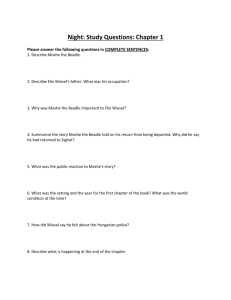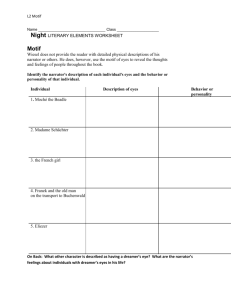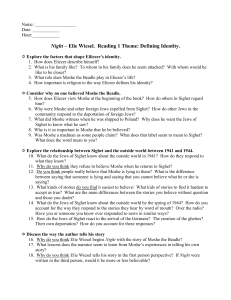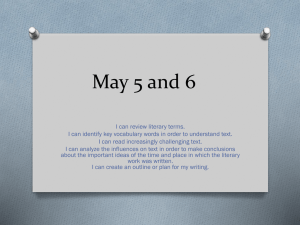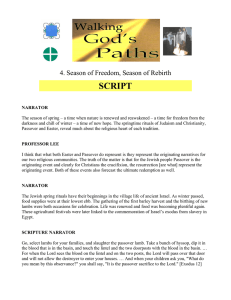Night Study Guide Chapter 1 Vocabulary Beadle – n. in Judaism
advertisement
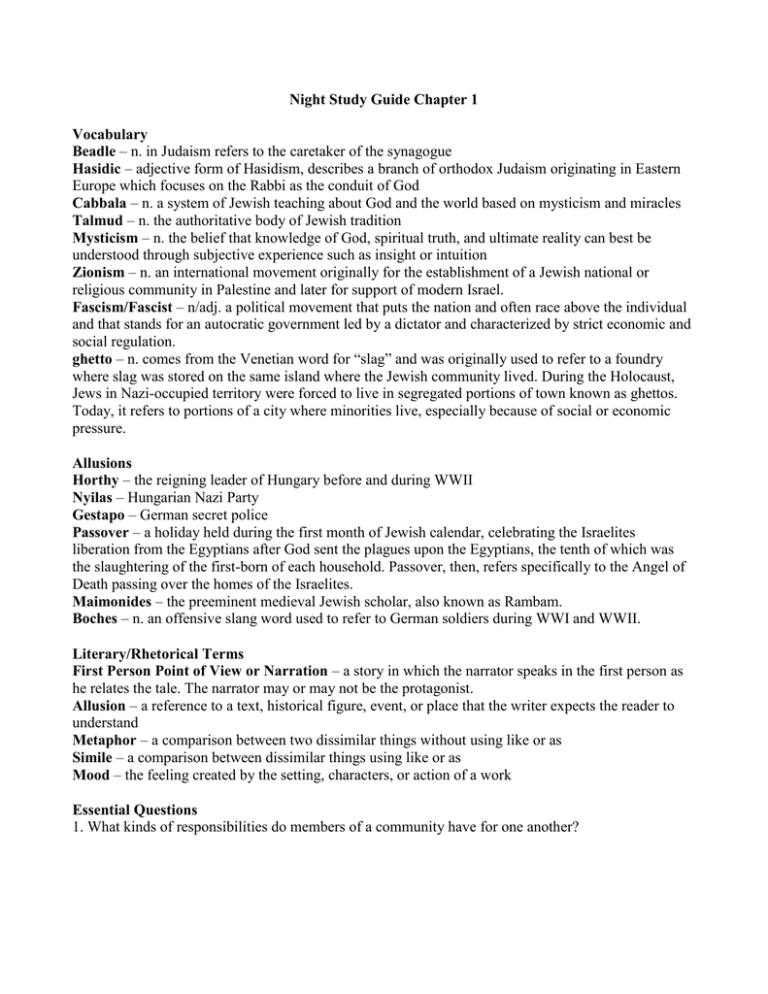
Night Study Guide Chapter 1 Vocabulary Beadle – n. in Judaism refers to the caretaker of the synagogue Hasidic – adjective form of Hasidism, describes a branch of orthodox Judaism originating in Eastern Europe which focuses on the Rabbi as the conduit of God Cabbala – n. a system of Jewish teaching about God and the world based on mysticism and miracles Talmud – n. the authoritative body of Jewish tradition Mysticism – n. the belief that knowledge of God, spiritual truth, and ultimate reality can best be understood through subjective experience such as insight or intuition Zionism – n. an international movement originally for the establishment of a Jewish national or religious community in Palestine and later for support of modern Israel. Fascism/Fascist – n/adj. a political movement that puts the nation and often race above the individual and that stands for an autocratic government led by a dictator and characterized by strict economic and social regulation. ghetto – n. comes from the Venetian word for “slag” and was originally used to refer to a foundry where slag was stored on the same island where the Jewish community lived. During the Holocaust, Jews in Nazi-occupied territory were forced to live in segregated portions of town known as ghettos. Today, it refers to portions of a city where minorities live, especially because of social or economic pressure. Allusions Horthy – the reigning leader of Hungary before and during WWII Nyilas – Hungarian Nazi Party Gestapo – German secret police Passover – a holiday held during the first month of Jewish calendar, celebrating the Israelites liberation from the Egyptians after God sent the plagues upon the Egyptians, the tenth of which was the slaughtering of the first-born of each household. Passover, then, refers specifically to the Angel of Death passing over the homes of the Israelites. Maimonides – the preeminent medieval Jewish scholar, also known as Rambam. Boches – n. an offensive slang word used to refer to German soldiers during WWI and WWII. Literary/Rhetorical Terms First Person Point of View or Narration – a story in which the narrator speaks in the first person as he relates the tale. The narrator may or may not be the protagonist. Allusion – a reference to a text, historical figure, event, or place that the writer expects the reader to understand Metaphor – a comparison between two dissimilar things without using like or as Simile – a comparison between dissimilar things using like or as Mood – the feeling created by the setting, characters, or action of a work Essential Questions 1. What kinds of responsibilities do members of a community have for one another? Getting Things Straight 1. 2. 3. 4. 5. Describe Moshe the Beadle. In what year does this story begin? How old was the narrator at that time? Describe the narrator’s family. Why does Moshe say he prays and what kinds of prayers does he make? When the narrator and Moshe reunite after a separation of several months, what story does Moshe tell about the deportees? How did the townspeople of Sighet respond? 6. What was the attitude of the people of Sighet in the Spring of 1944? 7. What happened around Passover in 1944? 8. Describe the ghettos. 9. What is the peoples’ initial reaction to the ghettos? 10. How much time were the Jews of Sighet given to prepare to be deported? What were they permitted to take with them? 11. What event caused the narrator to witness his father’s weeping for the first time in his life? 12. Why were there no Hungarian police present at the expulsion? Delving In 1. In several places as the situation in Sighet begins to grow tense and then becomes a living nightmare, Wiesel says that the overall mood among the people was not bad, that things returned to normal, or that they got used to the situation. Why does he emphasize this aspect of their experience? 2. Wiesel mentions three times when he and his family could have been spared from the Holocaust. Why does he mention these instances as he recounts his tale? 3. Throughout this chapter, Wiesel emphasizes night falling on three separate occasions. How does his emphasis on nightfall affect the mood of the story?
